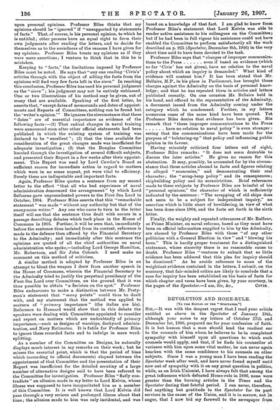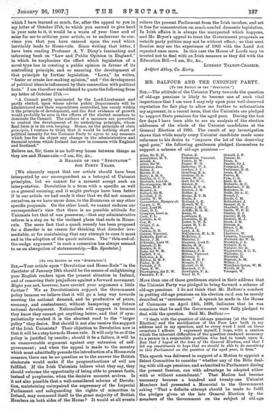DEVOLUTION AND ROME-RULE.
[To Ts. EDITOR Or TEE SPECTATOR...1 SIE,—It was with the deepest regret that I read your article entitled as above in the Spectator of January 19th, although your notes to my letters of October 27th and December 1st, 1906, prepared me for your confession of faith. It is but human that a man should lend the readiest ear to the counsels of him whom he believes to be in completest sympathy with himself upon all questions to which such counsels would apply, and that, if he finds his counsellor at variance with him upon some vital matter, he can never again hearken with the same confidence to his counsels on other subjects. Since I was a young man I have been reading the Spectator week after week, and have never found myself until now out of sympathy with it on any great question in politics, while, as an Irish, Unionist, I have always felt that among the great influences which defeated Home-rule in 1886, none were greater than the burning articles in the Times and the Spectator during that fateful period. I can never, therefore, feel anything but gratitude to the Spectator for its past services in the cause of the Union, and it is in sorrow, not "As anger, that I now bid my farewell to the newspaper from
which I have learned so much, for, after the appeal to you in thy -letter of October 27th, to which you seemed to give heed in'yonr note to it, it would be a waste of your time and of mine for me to criticise your article, or to endeavour to con- vinCe you that you have entered upon the road which inevitably leads to Home-rule. Since writing that letter, I have been reading Professor A. V. Dicey's fascinating and informing book on "Law and Public Opinion in England," in which he emphasises the effect which legislation of a novel type has in creating a public opinion in faVotu• of its controlling principle, and so ensuring the development of that principle by further legislation. "Laws," he writes, "foster or create law-making opinion," and "the development of political ideas is influenced by their connection with political facts." I am therefore emboldened to quote the following from my letter of October 27th :—
" A Council partly nominated by the Lord-Lieutenant and partly elected, upon whose advice public Departments will be administered and their expenditure controlled, has surely within it the principle of development, and the first evidence of growth would probably be seen hi the efforts of the elected members to dominate the Council. The authors of a measure are powerless to control the development of its underlying principle, whose final form is in its own keeping. Hence, on the principle of obsta yrincipiis, I venture to think that it would be nothing short of political insanity for the Unionist Party to agree to any measure which has for its object any change in the administrative and financial system which Ireland has now in common with England and Scotland."
Believe me, Sir, there is no half-way house between things as they are and Home-rule.—I am, Sir, &c.,
A READER OF THE " SPECTATOR " FOR FORTY YEARS.
[We sincerely regret that our article should have been interpreted by our correspondent as a betrayal of Unionist principles, but we cannot for a moment accept such an interpretation. Devolution is a term with a specific as well as a general meaning, and it might perhaps have been better if in our article we had made it clear that we did not commit ourselves, as we have never done, to the Dunraven or any other specific proposals. On the other hand, we cannot endorse our correspondent's view that there is no possible attitude for Unionists but that of won p(1861071,148,—that any administrative reform is a step on to the inclined plane that ends in Home- rule. The mere fact that a quack remedy has been proposed for a disorder is no reason for thinking that disorder irre- mediable, or for maintaining that any attempt to cure it must end in the adoption of the quack solution. The "thin-end-of- the-wedge argument" in such a connexion has always seemed to us an abnegation of statesmanship.—En. Spectator.]























































 Previous page
Previous page